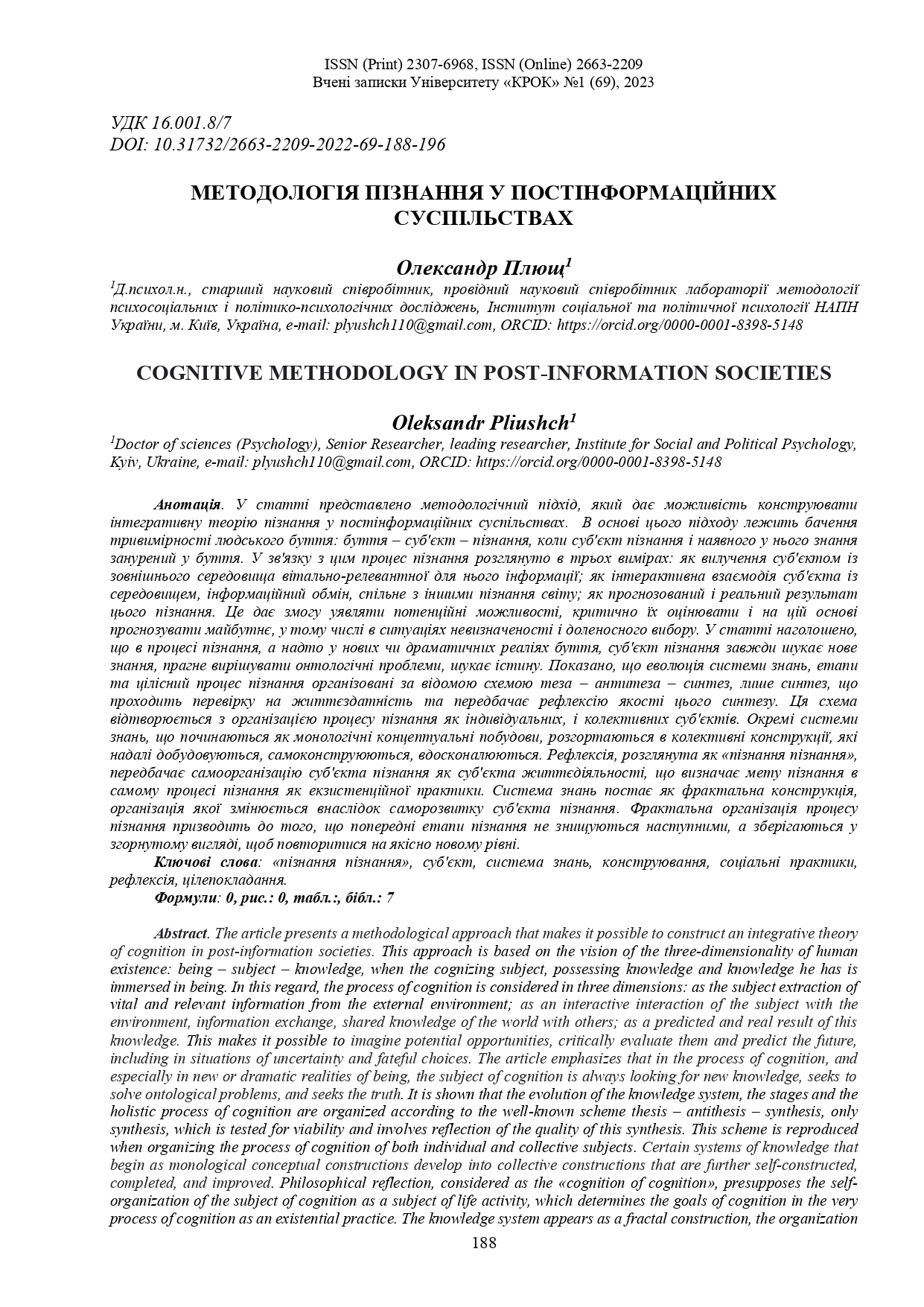COGNITIVE METHODOLOGY IN POST-INFORMATION SOCIETIES
DOI:
https://doi.org/10.31732/2663-2209-2022-69-188-196Keywords:
cognition of cognition, subject, knowledge system, construction, social practices, reflection, goal settingAbstract
The article presents a methodological approach that makes it possible to construct an integrative theory of cognition in post-information societies. This approach is based on the vision of the three-dimensionality of human existence: being – subject – knowledge, when the cognizing subject, possessing knowledge and knowledge he has is immersed in being. In this regard, the process of cognition is considered in three dimensions: as the subject extraction of vital and relevant information from the external environment; as an interactive interaction of the subject with the environment, information exchange, shared knowledge of the world with others; as a predicted and real result of this knowledge. This makes it possible to imagine potential opportunities, critically evaluate them and predict the future, including in situations of uncertainty and fateful choices. The article emphasizes that in the process of cognition, and especially in new or dramatic realities of being, the subject of cognition is always looking for new knowledge, seeks to solve ontological problems, and seeks the truth. It is shown that the evolution of the knowledge system, the stages and the holistic process of cognition are organized according to the well-known scheme thesis – antithesis – synthesis, only synthesis, which is tested for viability and involves reflection of the quality of this synthesis. This scheme is reproduced when organizing the process of cognition of both individual and collective subjects. Certain systems of knowledge that begin as monological conceptual constructions develop into collective constructions that are further self-constructed, completed, and improved. Philosophical reflection, considered as the «cognition of cognition», presupposes the self-organization of the subject of cognition as a subject of life activity, which determines the goals of cognition in the very process of cognition as an existential practice. The knowledge system appears as a fractal construction, the organization of which changes due to the self-development of the subject of knowledge. The fractal organization of the process of cognition leads to the fact that the previous stages of cognition are not destroyed by the subsequent ones, but are stored in a collapsed form, so that later they can be repeated at a qualitatively new level.
Downloads
References
Інформаційний вплив: теорія і практика прогнозування / за ред. П.Д. Фролова; Національна акад. пед. наук України, Ін-т соц. та політ. психології. К.: Міленіум, 2011. 304 с.
Модернізаційні процеси в освіті та суспільстві: психотехнології супроводу / за ред. П.Д. Фролова; Національна акад. пед. наук України, Ін-т соц. та політ. психології. Кіровоград: Імекс-ЛТД, 2013. 312 с.
Найдьонов М.І. Формування системи рефлексивного управління в організаціях. К.: Міленіум, 2008. 484 с.
Петрунько О.В. Молодь та інноваційні технології: перспективи і ризики взаємодії. Кіровоград: Імекс-ЛТД, 2013. 84 с.
Петрунько О.В. Соціалізаційний потенціал медіа середовища. Соціальна психологія. Науковий журнал. Спецвипуск. Київ, 2007, 71-83.
Петрунько, О.В. & Плющ, О.М. (2021). Перспективи застосування екологічного підходу в сучасних психологічних дослідженнях. Вчені записки Університету «КРОК», 4 (64), 205–216.
Плющ О.М. Соціально-психологічні механізми інформаційного впливу в постіндустріальному суспільстві : дис. ... доктора психолог. наук : 19.00.05. Київ : Інститут соціальної та політичної психології НАПН України, 2018. 400 с.

Downloads
Published
How to Cite
Issue
Section
License

This work is licensed under a Creative Commons Attribution-NonCommercial 4.0 International License.

